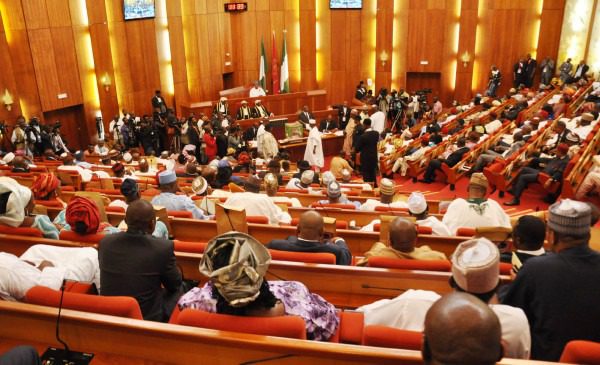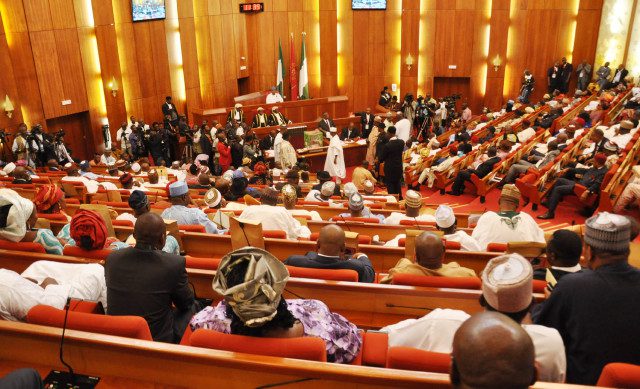Political Issues
NASS Clerk: Ripples After The Storm -By Ayuba Ahmad


Last month, the National Assembly Service Commission, in fulfillment of one its key statutory obligations, announced the appointment of the erstwhile clerk of the House of Representatives, Alhaji Muhammed Sani Ataba Omolori as the Clerk designate to the National Assembly. That decision was consequent on the impending exit of the substantive Clerk, Alhaji Salisu Maikasuwa who was due to go on the mandatory three month terminal leave that ends in August. Over an otherwise simple procedural action of the Commission, a furor was generated that attracted attention of the rest of the nation. It was a storm albeit, a storm in a tea cup because, it was one that was as unnecessary as it was blown out of proportion.
For reasons that have since turned out to be baseless, petitions began to fly all over the place in protest against the choice of Sani Omolori. The protest was hinged on the view of the protesters that, instead of the Prince from Okene, the Deputy Clerk, Mr Ben Efeturi was the more qualified and appropriate.
Very vociferously, they shouted blue murder, alleging nepotism based on our usual fault lines of religion and regional differences. The Chairman of the NASS Service, Dr. Muhammad Adamu Fika and the outgoing Clerk, Salisu Maikasuwa, all of who are Muslims and from the north were portrayed as having favoured one of their own, Sani Omolori, against Mr. Efeturi, a Christian from the south.
At a time when some idle and reckless mischief makers are making a past time of strenuously if vainly portraying President Muhammadu Buhari as having an “agenda of Islamising the country” and of pursuing a conscious policy of sidelining people of a particular ethnic extraction in appointment to “sensitive, lucrative” positions, the protestants certainly had the motive of invoking passions in some quarters. They would have expected their allegations of blatant bending of the rule in favour of Omolori, a perfect article that will make headlines in the mass media.
The smoldering fire was fanned and set further aglow by the Senate President, Bukola Abubakar Saraki, when, in spite of his own consuming battle with the Code of Conduct Tribunal found the time to come out with a letter directing chairman of the Commission to reverse Omolori’s appointment. The impression given by the Senate president’s intervention was that, indeed, something awfully untoward had occurred.
Alas, it turned out that, while the protesters had no grounds whatsoever, the Senate president, though, the leader of the two chambers of the National Assembly, does not possess the constitutional powers over the issue at stake —even if there were abnormalities in the emergence of the Clerk of NASS. But, if one may ask, why should the appointment of a Clerk warrant such high degree of fuss and rancour? The answers are to be found in the powers and functions of the Clerk as well as, the place of the parliament as a critical and sensitive institution of governance in a democracy.
The Parliament or the Legislature whose two chambers are collectively summed up as the National Assembly in our case, is universally a defining feature of democratic system of government. Without a parliament, there is no representative of the people and therefore, such a system is either called a Dictatorship the like that, Nigeria had for decades until May 1999 or, Aristocracy the vestiges that are seen in the fast crumbling monarchical systems in parts of the Middle-East. A small enclave compares to the other two arms of the Executive and Judiciary, yet, the Legislature comes off as the most significant. And, there is the prestige that goes with the powers exclusively centered on the Legislature to enact or repeal laws of the land. There should be no wonder then that, the office of the Clerk, ideally no more than that of a Permanent Secretary, has become a cynosure of attention and envy of all within the enclave and beyond. What is more, the duties and scopes and powers of the Clerk can be as enormous as they are awesome.
The Clerk is the pinnacle of the various authorities that oversee the efficient performances of all the offices and departments that enhance smooth running of the Legislature. The Clerk is the chief administrative and accounting officer and coordinator of Legislative activities of both Houses. He is the conveyor of laws and resolutions from the National Assembly to the President and also performs the colourful but occasional role of sitting at the Table in the Chamber at Joint Sessions of the National Assembly. The Clerk is as well, the one that defends the National Assembly before the Appropriations Committees of the two Houses. It is also the duty of the Clerk to bring and give advice to, the presiding officers, Speaker and President on administrative and legislative matters relating to the two chambers. The presiding officers are also expected to rely on the Clerk for advice on issues of international dimensions that concern the National Assembly. Thus, the logical explanation for the staccato and frenzy that usually attend the appointment of a new Clerk.
For some, the attraction is the grandeur. To several others, the office of Clerk is coveted simply and purely because of its lucre, its prospects of enhancing pecuniary, mundane and self-centered material benefits. Only very few would care as to who becomes the Clerk on the altruistic concerns over capability and competence needed for efficiency.
On the later note, the qualification, experience and track record that makes Muhammed Sani Omolori, a suitable candidate to the office cannot be called to question. He is by all standards and criteria, eminently qualified. Having spent close to three decades in the service of the National Assembly, with a degree in Law and beginning as a Clerk – at – Table, and climbing through the rungs to his last position of Clerk of the House of Representatives, he certainly cannot be said to lack the appropriate and requisite experience. How then, is it morally, ethically and rationally correct to want to sacrifice such an embodiment of merit on the putrid, sentimental and pedestrian altars of ethnicity and similar primordial considerations all in the name of the imperatives of the so called geo-political balancing?
Be that as it may, it is a good story that at the end of the storm there seems to be calm in the eventual affirmation of Muhammed Sani Omolori’s appointment as Clerk to the National Assembly for, Insha Allah, the next five years. It is at once a victory of due process, constitutionalism and common sense, just as it is to some extent, a garland for an individual’s diligence, hardwork or commitment to service.
Ahmad is a Kaduna-based public affairs commentator










